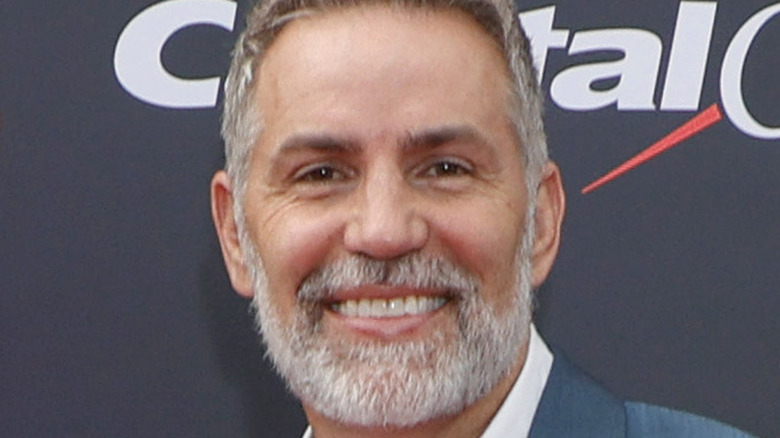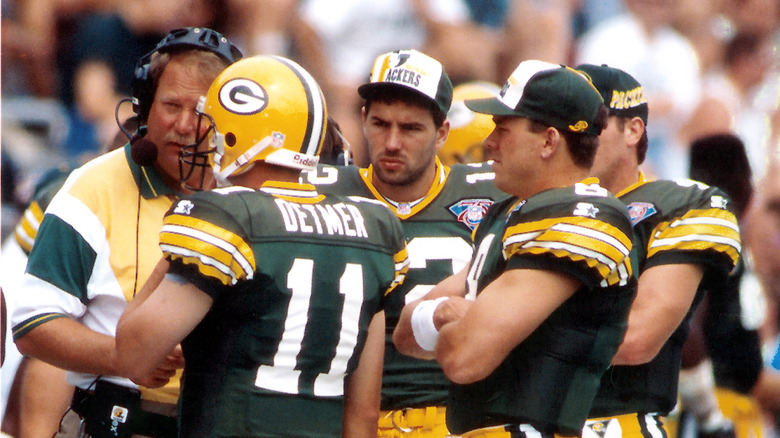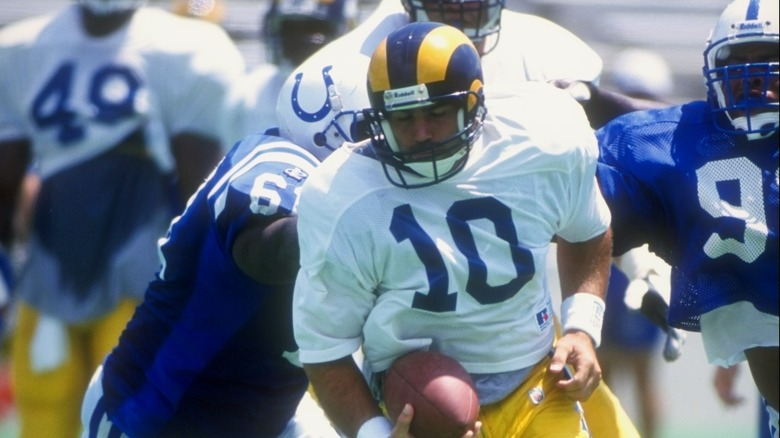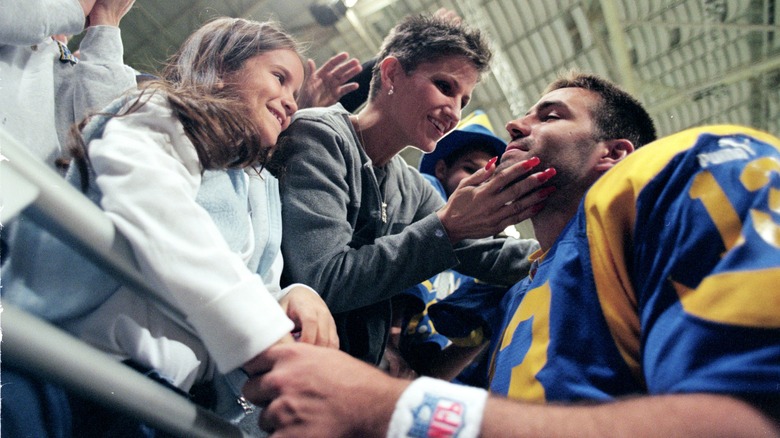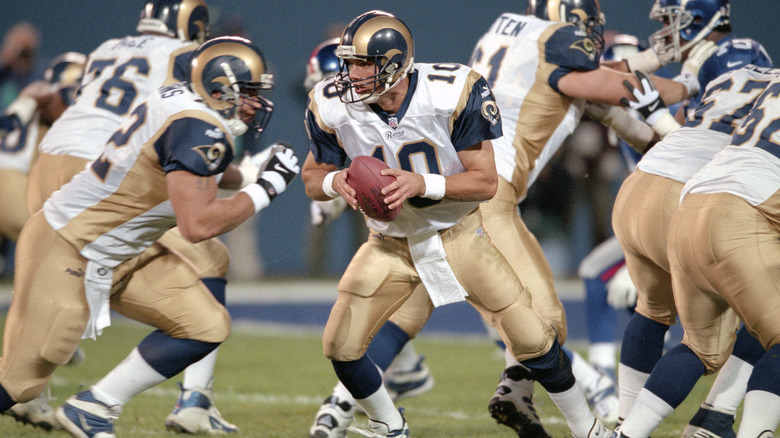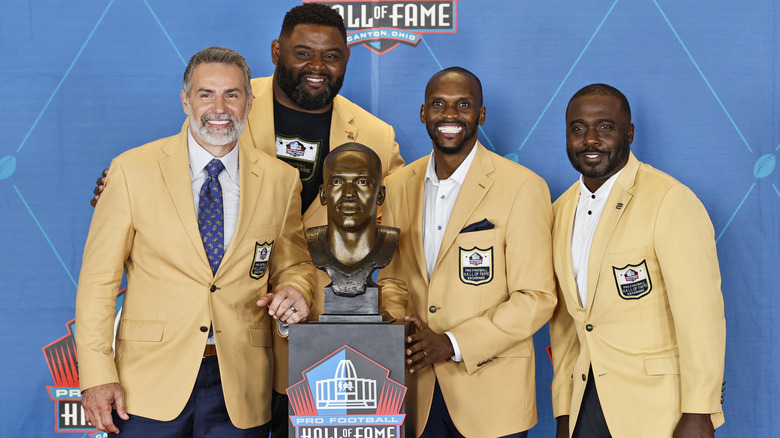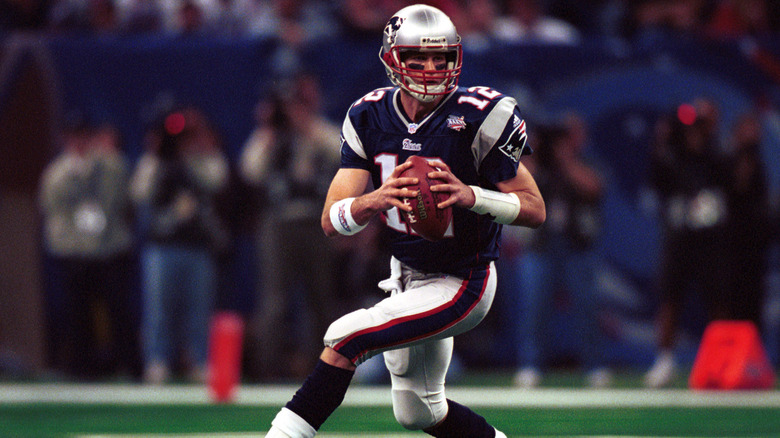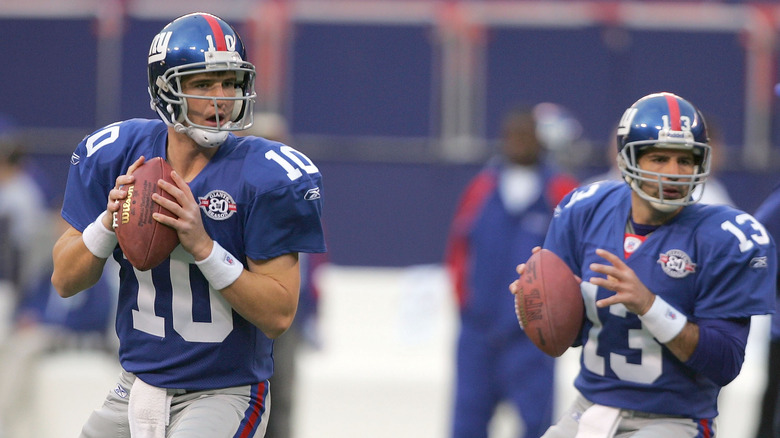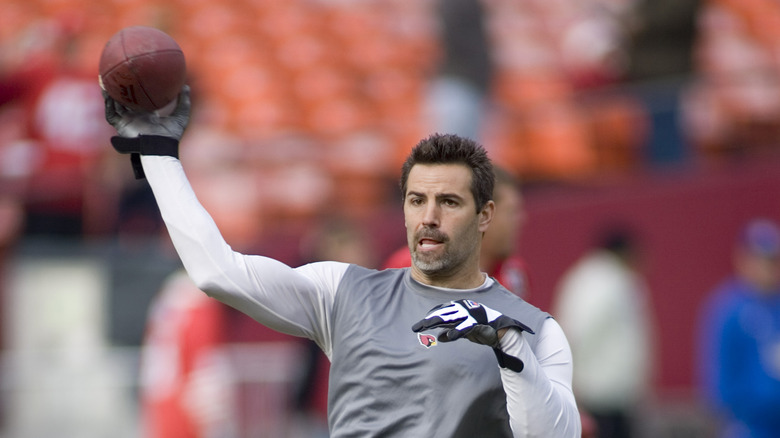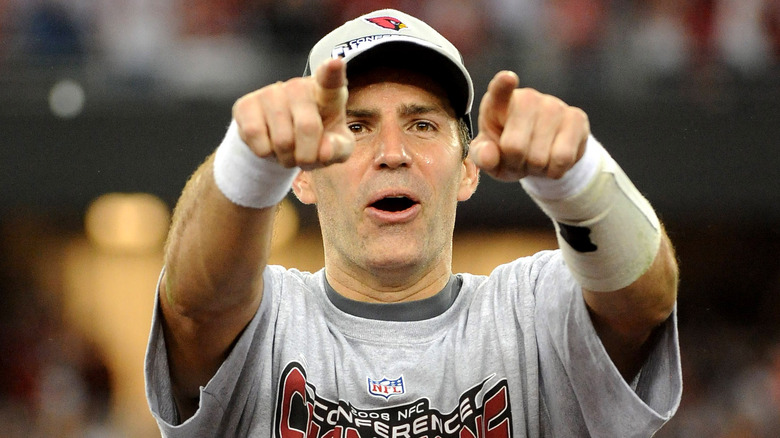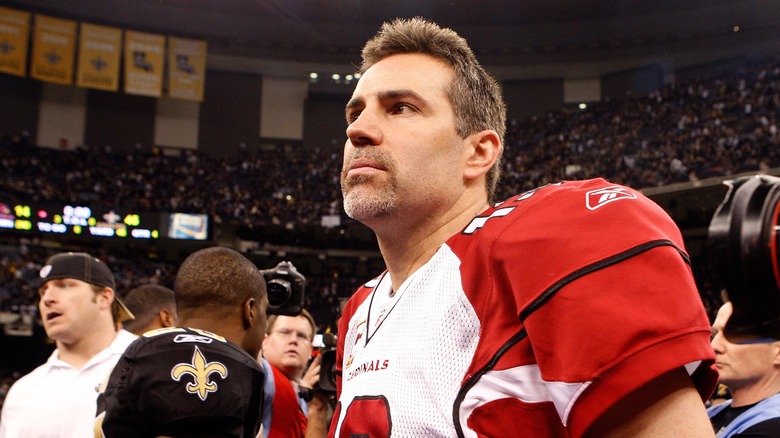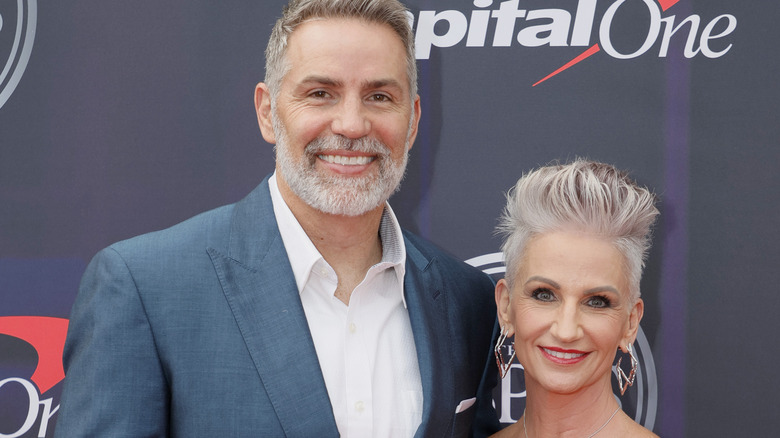The Untold Truth Of Kurt Warner
In December 2021, "American Underdog" will hit the big screens. Starring Zachary Levi, Anna Paquin, and Dennis Quaid, the film is a biopic of one of the greatest underdog stories in all of sports — the life and career of former NFL quarterback Kurt Warner. Whether the film will become Oscar gold or the Razzies' favorite whipping boy, a two-hour movie can only do so much justice when telling the story of the famed quarterback.
Warner's life story is half an American epic and half the plot of a daytime soap opera. He went from working at a grocery store while playing semi-professional football to keep his dream alive to playing in the NFL. After years of struggling, Warner finally got the opportunity and made the most of it, becoming a Super Bowl champion and eventually a member of the Pro Football Hall of Fame. But even after he made it to the NFL, Warner still faced obstacles. And like a phoenix, he picked himself up and set new marks in the league, as if Rocky Balboa decided to put down his gloves and pick up a helmet.
An executive producer for his own biopic, Warner knows people look at his life for inspiration, OutKick reports. "I've had so many people over the years say they've been inspired, they've been encouraged by my story. And that's what I think is so cool."
Here is the untold truth of Kurt Warner.
Kurt Warner was undrafted and quickly released
According to Pro-Football-Reference.com, the 1994 NFL Draft had 222 players selected and another two players selected in the supplemental draft. Somehow, out of all those players — including nine quarterbacks — Kurt Warner was not drafted. Shocking in hindsight, this was not surprising in 1994, as Warner did not really give NFL scouts and general managers much to go off of while in college.
As told by Britannica, Warner was unable to earn the full-time starting quarterback spot until his fifth and final year. Still, in that lone year as the starter for the University of Northern Iowa, he was named the Gateway Conference's top offensive player. Warner was far from an NFL-ready quarterback, but scout Dan Shonka saw enough in the young player to push Green Bay Packers general manager Ron Wolf to sign him.
Still, Shonka knew Warner had a tough road to climb to make the Packers roster, per Packers Wire. "I was happy Warner got his break," he said of Warner's signing. "I knew the Packers were loaded with Brett Favre, Mark Brunell, and Ty Detmer, but I thought he would have a chance as a practice squad quarterback." Nevertheless, Warner was unable to stand out to his Packers coaches. And during the summer of 1994, only a few months after his signing and before the regular season, Warner was released. It would take four years for him to make an NFL roster.
Kurt Warner's 4-year odyssey out of the NFL
For most players, the quick exit from the Green Bay Packers would be viewed as the end of their NFL careers. But as told by Biography, Kurt Warner did not give up on his NFL dreams and continued to practice at his alma mater. All at the same time, Warner worked as a grocery store stocker, making $5.50 an hour to support his future wife and her two children from a previous marriage.
According to CantonRep, Warner signed with the Iowa Barnstormers of the Arena Football League — a decision he would look back as very important in his development as a quarterback. "The nature of the Arena League is that the speed of the game is so fast," he said. "My accuracy needed to develop, and the way I moved in the pocket and worked in a confined field. It did nothing but hone my skills."
Warner made the most out of his three seasons with the Barnstormers. He led Iowa to back-to-back championships in 1996 and 1997 and was named first-team All-Arena those same years. ESPN reports that in 1998, Warner finally achieved his dreams when he was signed by the NFL's St. Louis Rams. After the Rams signed him, they allocated him to NFL Europe — a sort of minor league for NFL teams in the country, where the league hoped the sport would become more popular. And like the AFL, Warner shined as the best quarterback in his short time across the Atlantic.
Kurt Warner's wedding and a spider bite ended his NFL tryout
As much as Kurt Warner desired to play in the NFL in 1997, three years out from being cut by Green Bay, even he understood not to put the game he loved over the woman he loved. According to Sportscasting, Warner earned a tryout with the Chicago Bears after a successful career in the AFL. But the tryout was happening on Friday, and Brenda reminded her future husband that their wedding was that weekend!
Brenda was understandably upset at the idea that her soon-to-be husband was leaving hours before their wedding. As Kurt recounts: "I ran and told my wife that next Friday I'm going to Chicago for a tryout with the Bears. She kind of looked at me funny and I asked her why aren't you excited for me. She goes, 'Well, cause we're getting married on Saturday, you're not going to Chicago the day before our wedding.'"
As much as Warner wanted to make the tryout, he was smart enough to not anger his wife before she actually became his wife. He decided to stay home and go through with the ceremony and hoped to attend the workout after the weekend. However, mother nature interfered with those plans. Over the weekend, Kurt was bitten on his throwing elbow by a spider, preventing him from being able to throw. He tried to reschedule with the Bears, but the team never answered his calls.
Kurt Warner got his start because of an Injury
Finally a quarterback on an NFL roster, the mature Kurt Warner entered the 1999 season as the backup quarterback for the St. Louis Rams. The season marked a turning point for both Warner and the team. In particular, coach Dick Vermeil was entering his third season and could only muster nine wins during that span, as explained in the 1999 St. Louis Rams' "America's Game." So the team made two major moves during the off-season: They signed quarterback Trent Green from Washington to be their starter and traded for superstar running back (and the second pick in the 1994 draft) Marshall Faulk. The excitement for the season was high, but in the third preseason game, Green was lost after suffering a serious knee injury.
Losing one's starting quarterback before the season begins is devastating. Coach Vermeil even got emotional during a press conference when he told the press Warner was the new starter. Warner responded in his first three games by becoming the first player to throw three touchdown passes in his first three starts. Warner's early success increased the spotlight on the new star quarterback and the team as a whole. Along with Warner, new running back Marshall Faulk became the team's de facto leader, and the two new Rams led the team to a 6-0 record. As the team's offensive output grew higher and higher, a new nickname followed them.
Kurt Warner led a historic offense in St. Louis
Kurt Warner's first season as a starting quarterback was not only the best season of his career but one of the greatest seasons by any quarterback. Warner won the NFL MVP award, as told by Pro-Football-Reference.com, and the St. Louis Rams had their best season in generations, going 13-3 and scoring more points than any other team in football. By the end of the season, St. Louis won their first Super Bowl, and Warner would throw a then-record 414 passing yards in the game. The achievement earned him the game's MVP, according to the Pro Football Hall of Fame. The team's high-scoring offense set new marks in the NFL and earned the Rams the nickname "The Greatest Show on Turf."
The nickname came in 2000 from popular ESPN personality Chris Berman, who compared the Rams' high-powered offense to the famed Ringling Bros circus nicknamed "The Greatest Show on Earth." Indeed, the Rams used the turf to their advantage; as explained in "The Timeline: The Greatest Show on Turf," the team relied on speed and quick routes, which would be difficult on a grass surface, but not on the artificial turf they played under.
In 2000, the Rams were on pace to set multiple all-time offensive records before Warner went down with a broken finger, missing multiple games, per "The Timeline: The Greatest Show on Turf." Ultimately, Faulk took over the load on the team and earned league MVP. Despite this and Warner's return, St. Louis would fall early in the postseason. Undeterred, they set out to win a second championship in 2001.
Upset in the Super Bowl by Tom Brady
After an injury-plagued 2000 season that ended in the first round of the postseason, the St. Louis Rams returned healthy and with a vengeance in 2001. Warner once again was named the league's MVP, and St. Louis returned to the Super Bowl. According to History, St. Louis entered the game as 14-point betting favorites. And standing across from them was the New England Patriots, led by a young quarterback who — like Warner in 1999 — was in his first year as the starter after replacing the Patriots' injured quarterback. The young quarterback's name was Tom Brady.
New England's strength was not its offense, but its defense. Coach Bill Belichick had spent the 1980s as the defensive coordinator for the New York Giants, winning two Super Bowls during his tenure. In Super Bowl XXV against the Buffalo Bills' "K-Gun" — an offensive style that mirrors the Rams' personnel and productivity — Belichick's gameplan held the team to only 19 points in an upset victory, Sports Illustrated reports.
Against the Rams, Belichick's defense once again shut down a historic offense, forcing multiple turnovers and keeping St. Louis from getting in rhythm, NFL Films details. Down by two touchdowns in the final quarter, Warner led the Rams to 14 unanswered points to tie the game 17-17 with just over a minute left. But this was enough time for Brady, who led New England down the field to set up the game-winning field goal for Adam Vinatieri. Per NFL, New England won the game 20-17.
Kurt Warner backed up Eli Manning for a year
Unbeknownst to the St. Louis Rams and Kurt Warner, the loss marked the end of their team. According to Secret Base, Warner missed most of the 2002 season with a broken pinky and then a broken right hand (his throwing hand). In 2003, a concussion in the first week of the season put him back on the sidelines, and the productive play of backup Marc Bulger kept him there. On June 1, 2004, St. Louis released Warner in order to solidify Bulger as the new starting quarterback, per Secret Base.
It took Warner only two days before he found a new home. As detailed by ESPN, Warner signed to a one-year deal with the New York Giants. The reason for the short deal was that two months prior, New York had traded to acquire the top pick in the 2004 NFL Draft, Ole Miss quarterback Eli Manning.
According to Giants.com, Warner started the season with a 4-1 record before losing two of his next three games. Wanting to give the rookie Manning experience, coach Tom Coughlin benched Warner, despite being the better quarterback on the roster. "When Tom brought me in, he told me, 'It's not because Eli is better. It's just because this is what we have to do,'" Warner said. "I give Tom so much credit because he looked me in the eye and told me, 'This is why. It's not fair to you. You've got to deal with it.'" It would be Warner's only season in New York.
Wearing a glove saved Kurt Warner's career
Gloves are an essential part of any football player's attire. This includes the quarterback, though they tend to wear a single glove on their non-throwing hand. Outside of bad weather that forces them to put on a glove to grip the ball, the majority of quarterbacks go without a glove on their throwing hand. For Kurt Warner, however, his career was saved by adopting the two-glove style later in his profession.
After a year in the Big Apple, Warner joined the Arizona Cardinals, where it looked as if he would continue the formula of being the veteran quarterback who would surrender his job to the rookie. As told by Sports Illustrated, after a subpar season with the 2005 Cardinals, Arizona drafted USC quarterback Matt Leinart in hopes that he would be the quarterback for the future. Near the end of the 2006 season, Warner began wearing a glove on his throwing hand, which had been injured multiple times in St. Louis. This move might have been what led to the turning point in his Cardinals career.
According to The Postgame, Warner replaced the injured Leinart (sounds familiar) late in the 2006 season. Over the next three seasons, Warner would return to his early St. Louis Rams form, putting up fantastic numbers and leading Arizona to a Super Bowl appearance in 2008. During the season, Warner attempted to throw without a glove after breaking his index finger, but he could barely manage and quickly returned to the glove.
Kurt Warner is a man of faith
Prayer circles before and after football games are very common. For Kurt Warner, with the wild journey that was his career, it is not surprising that he had faith in someone upstairs looking down at him. After winning the Super Bowl, the first remarks the quarterback made as confetti rained down were in honor of Jesus, as seen on YouTube. According to CBN, after winning the Super Bowl, Warner was featured in the autobiographical series "Positivity for Kids" — a children's books series that focuses on athletes of faith.
Warner describes his faith and the tools of success in football in the book as so: "Success on any field starts with faith. Faith in yourself. Faith in teammates. Faith in coaches. And in my case, faith in God." Indeed, at the highest points of his football life, Warner always took time out to give thanks to his faith. After upsetting the Philadelphia Eagles in the NFC championship game to make it back to the Super Bowl, Warner had this to say when being interviewed: "Everybody is going to be tired of hearing this, but I never get tired of saying it. There's one reason I'm standing up on this stage today, that's because of my Lord up above. I got to say thanks to Jesus."
In 2017, when Warner was elected into the Pro Football Hall of Fame, the quarterback of faith concluded his speech by thanking Jesus, per NFL. "His final moment was for me. Mine is for him. Thank you Jesus."
Bountygate ended Kurt Warner's career
After three successful seasons as the Arizona Cardinals' starter, 38-year-old Kurt Warner entered the 2009-2010 postseason as one of the oldest quarterbacks in football. In the wild-card game against the Green Bay Packers, Arizona beat the Aaron Rodgers-led team in what would become the highest-scoring playoff game in the league's history, according to NFL. In the next round, Warner would play in the final game of his career against the New Orleans Saints.
During the game, Warner threw an interception, and while trying to run to make a tackle, he was blindsided and blocked by a Saints defender. The dazed Warner could only do so much as New Orleans ran away with a blowout victory. Warner retired from the NFL a month later, Biography details. Two years later, the NFL began investigating the Saints about an alleged "bounty" program, where defensive players were paid to knock out or injure opponents. As reported by ESPN, the investigation found that the Saints targeted the quarterbacks they faced on the way to the Super Bowl, including Kurt Warner and his old Packers teammate and Minnesota Vikings quarterback, Brett Favre.
According to Newsday, Warner said he was not surprised by the program but added that the hit was legal and that payments like that "have been a part of our league for a long time." The week after the Cardinals game, the Saints defenders hit Favre even harder, per Secret Base. According to Sportscasting, Favre became suspicious the Saints were targeting him during the game.
The tragic life of Brenda Warner
Like her husband, Brenda Warner's life can be made into a movie. In an interview with CBN to promote her autobiography — "One Call Away: Answering Life's Challenges with Unshakable Faith" — Brenda described how she has maintained a relationship with God in the face of trials and tragedy. "Circumstances don't determine who you are, and they are not a measure of God's love for you," she said.
Brenda was born and raised in a small town in Iowa. She enlisted into the Marines after graduating high school, and it was there where she met her first husband, Neil. The couple had a son named Zack, but at four months old, Neil accidentally dropped his son while picking him up out of the bathtub. The young baby hit his head, and it began to swell. At the hospital, Brenda learned her son had special needs that would be with him for the rest of his life.
While pregnant with their second child, Neil left Brenda for another woman. According to Risen Magazine, Brenda moved back with her parents and began to go to nursing school. A year later, at a country and Western bar her mother pushed her into going to, she met Kurt. The next morning, the future NFL star came to her home wanting to meet his future stepsons. Just as life began to turn for Brenda, in April 1996, her parents were killed when a tornado hit their small Arkansas town.
